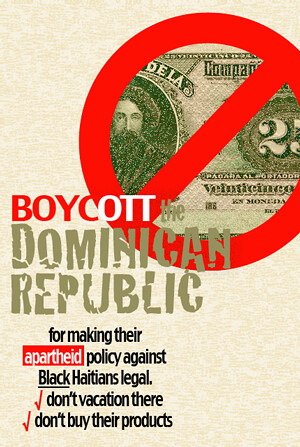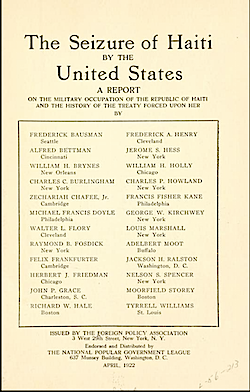All thanks go to ANJI for her scrupulous research and reporting of facts.
- Monsanto is donating “$4 million worth of conventional hybrid corn and vegetable seeds to be made over the next 12 months…” Donations will include 60 tons of hybrid corn and vegetable seeds, a second shipment of 70 tons and possibly another 345 tons over the next 12 months.
- The hybrid seeds create the need for water and fungicides that cost more than locals can afford. The price of the seeds as well as shipping will also ultimately likely cost more than Haitian farmers can afford.
- According to the Monsanto blog, the seeds are treated with fungicides to prevent fungal diseases. The New Jersey government issued a cautionary statement on commonly used fungicides such as Thiram, which is used as a fungicide and seed disinfectant, and can have negative impacts when you breathe it in. According to the NJ Department of Health and Senior Services Hazardous Substance Fact Sheet, it can also cause skin allergies, rashes and breathing problems and “repeated exposure can affect the kidneys, liver and thyroid gland. High or repeated exposure may damage the nerves.” The document also dubbed Thiram a mutagen and recommended wearing protective work clothing while exposed to Thiram and using local exhaust ventilation or respirators.
- Monsanto’s May 20, 2010 blog post claims the seeds are hybrid and not GMO. The donation of the seeds have long-term consequences because they create a dependency on Monsanto seeds, which are expensive and corrosive to the land. They also said: “There are no contractual obligations between Haitian farmers and Monsanto since this is a donation. In fact, there are no business transactions at all between Monsanto and Haitian farmers in regards to these seeds. Monsanto is earning no revenue from this donation.”
- Some seeds from Monsanto are described in the media as terminator seeds. According to the 2009 post on the Monsanto website, “Sterile seed technology is a type of Gene Use Restriction Technology (GURT) in which seed produced by a crop will not grow.” The company says it sees positive and negative aspects of GURT but claims it “has never developed or commercialized a sterile seed product… If Monsanto should decide to move forward in the area of GURTs, we would do so in consultation with experts and stakeholders, including NGOs.”
- The act of using these seeds contaminates the land and eliminates the ability of these Haitian farmers to grow and export organic agriculture in the near future. According to the California Organic Foods Act of 1979, foods described as organic or naturally grown must be produced: without the use of synthetically compounded fertilizers, pesticides or growth regulators. In the case of annual and two-year crops, no synthetically compounded fertilizers, pesticides or growth regulators may be applied to the area for 12 months before.
- The use of seeds also impacts the land in neighboring Dominican Republic.
- Monsanto has a history of making harmful chemicals. According to the Dow Chemical website, “Companies supplying Agent Orange to the government included The Dow Chemical Company, Monsanto Company, Hercules Inc., Diamond Shamrock Chemicals Company, Uniroyal Inc., Thompson Chemical and T-H Agriculture and Nutrition Company.” While Dow says “scientific consensus is that when the collective human evidence is reviewed, it doesn’t show that Agent Orange caused veteran’s illnesses,” the U.S. government thinks otherwise. On March 25, 2010, the U.S. Department of Veteran Affairs (VA) said this is a press release: “Well over 100,000 Veterans exposed to herbicides while serving in Vietnam and other areas will have an easier path to qualify for disability pay under a proposed regulation published by the VA that adds three new illnesses to the list of health problems found to be related to Agent Orange and other herbicide exposures.” Based on data from an independent study by the Institute of Medicine, these three illnesses are: B cell leukemias, such as hairy cell leukemia; Parkinson’s disease; and ischemic heart disease.





7 comments:
I think it is sad the the organic community is using fear to keep food away from starving people.
If agribusiness multinationals like Monsanto are telling the truth about their products, what do you suppose they have to fear so much from a report drafted on Britain's food supply (where GM foods are banned) that they stacked it with their own lobbyists:
GM lobby helped draw up crucial report on Britain's food supplies
Guardian UK -- June 6, 2010
"A powerful lobbying organisation representing agribusiness interests helped draft a key government report that has been attacked by environmentalists for heavily favouring the arguments of the genetically modified food industry.
The revelation comes after the resignation of two government advisers who have criticised the close relationship between the Food Standards Agency (FSA), the body that oversees the UK's food industry, and the GM lobby.
Emails between the FSA and the Agricultural Biotechnology Council (ABC) show the council inserted key sentences strengthening the case for GM food that ended up in the final report.
The report, "Food Standards Agency work on changes in the market and the GM regulatory system", examines how GM products are entering the UK, where the growing of GM products is banned, through the animal feed system. It acknowledges food prices could go up if GM products continue to be excluded.
Emails from the council which represents leading GM food companies such as Monsanto and Bayer to Dr Clair Baynton, the then head of novel foods at the FSA, show a close dialogue between both sides between 2008 and August 2009, when the report was published."
The World According to Monsanto
It's not a pretty picture
Another thing:
Look at what Monstanto did to India among other places.
Despite the crap you see on tee vee or on mainstream media regarding India's so-called booming economy, a farmer in India commits suicide every other hour.
The propagandists have tried to put it at 200,000, but the toll is obviously in the millions since 200,000 has been reported since 6 or so years ago, AND, although women in India do most of the farming work, they're recorded as "farmers wife," which allows the government to downplay the severity of the problem.
In other words, Monsanto is guilty of genocide because it can't be suicide if it's systematic.
Call me conspiratorial, but the plan to depopulate Haiti will fail, and that includes protesting Monsanto's seeds of suicide.
This story is riddled with complete and utter fabrications. Please learn more about agriculture before trying to pass yourself off an expert or even the least bit knowledgeable on corn production.
This type of misinformation only harms the process of trying to maintain transparency with corporations like Monsanto and others. When you twist the facts into lies, it hurts us all.
@Anonymous Thank you for your comment. Please be specific about what you believe are "complete and utter fabrications."
seanmcn, this campaign was initiated by the organic community in Haiti. A peasant group and their agronomists have been building towards food security and independence in Haiti for decades - and they recognize a Trojan horse when the see it. Wouldn't it be sad if Monsanto could come in to the country and wipe out all their work with this one "gift."
Post a Comment